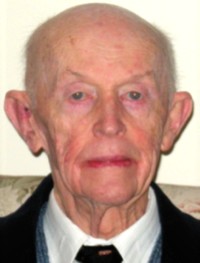
Basil Cooke was born in Johannesburg, where he attended King Edward VII School. After leaving high school, he took a BA and an MA at Cambridge University in England before returning to South Africa to obtain an MSc and DSc from the University of the Witwatersrand. Basil then taught at Wits until he emigrated to Canada with his family in 1961, apart from during World War II when he served in the South African Air Force.
In Halifax, Nova Scotia, Basil lectured at Dalhousie University for the next 20 years. During this time, he also served as Dean of the Faculties of Arts and Science for six years. He remained an Emeritus Professor at Dalhousie after his retirement in 1981 although he and his wife, Dorette, moved to White Rock, British Columbia, where they became active in the local community and continued to travel widely. One of Basil’s particular interests was the Royal Commonwealth Society, of whose local branch he was President for several years.
Basil’s formal education was as a geologist and, as a consequence, he was well known in cave and karst circles of the former Transvaal. He was, however, probably best known as one of the pioneering African palaeontologists, especially in the area of the evolution of fossil pigs. However he was a conspicuous multi-disciplinarian interested in applying and developing his knowledge to improve our understanding of African Quaternary geology and palaeontology as well as human evolution. During his long life, Basil himself continued to evolve as a scientist and published papers and books over an extraordinary period, beginning in 1938 and ending in 2006 with an invited book chapter.
Basil’s many academic achievements were recognised publicly through his receipt of an Honorary LLD from Dalhousie University in 1982 and an Honorary DSc from the University of the Witwatersrand in 1998. In 2006 the Royal Society of South Africa published a festschrift to him in the Transactions of the Royal Society of South Africa 61(2). More privately, and just as tellingly, Basil was also greatly respected by individual academic peers. Both this fact and the breadth of Basil’s scholarship are well documented in the festschrift, and it is not necessary to repeat facts here. Fellows and Members are urged to read this issue of the Transactions, if they have not done so, to learn more about the life of this last of the pioneering greats of African palaeontology.
